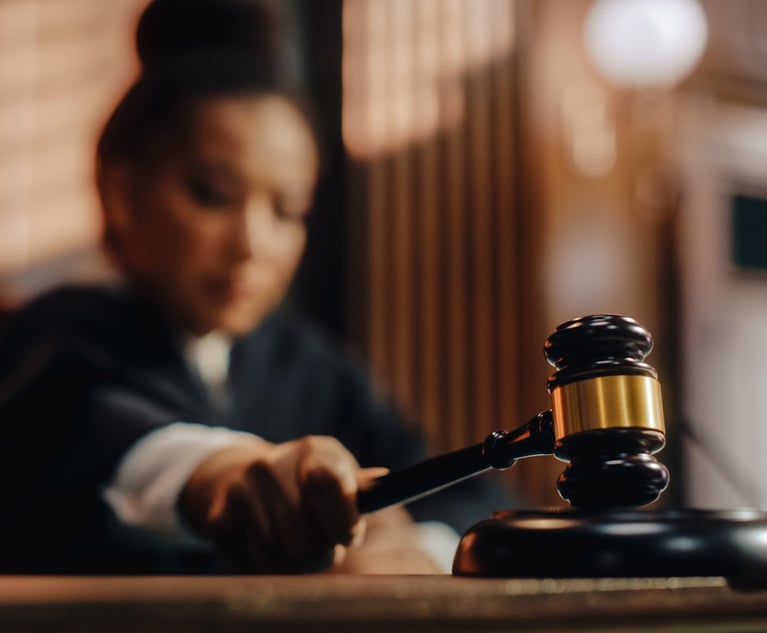Students From UPenn, Other Elite Law Schools Vow to Combat Mental Health Suffering on Campuses
"Students left behind are not failures of personal strength. They are testaments to our collective failure to uplift one another and raise the standards of our trade."
December 01, 2017 at 05:23 PM
5 minute read
The original version of this story was published on Law.com

The student leaders from 13 of the nation's top law schools have pledged to broaden mental health initiatives on their campuses and to fight the stigma of seeking treatment.
The pledge comes at a time that law schools nationwide have launched initiatives to address students' mental health struggles, in the wake of several eye-popping studies showing the levels of anxiety, depression and substance abuse among both law students and practicing lawyers are far surpassing the general population. Read the pledge here.
“Students left behind are not failures of personal strength. They are testaments to our collective failure to uplift one another and raise the standards of our trade,” states the letter signed by student government presidents from 13 of the so-called T-14 law schools. Those signing the letter come from Yale Law School, Stanford Law School, Harvard Law School, the University of Chicago Law School, Columbia Law School, New York University School of Law, the University of Pennsylvania Law School, the University of Michigan Law School, Duke University School of Law, Northwestern University Pritzker School of Law, the University of California, Berkeley, School of Law, Cornell Law School and the University of Texas School of Law.
The student presidents wrote that it's become an accepted, stereotypical assumption that students will see a toll on their mental health while in law school. But poor health shouldn't be seen as a necessary byproduct of legal education—it must be treated “as the scourge of the profession that it is.”
We spoke with Chris O'Brien, president of the Council of Student Representatives at Penn Law, who initiated the conversation about the pledge in an online group composed of the student government presidents of the T-14 law schools. Here are his answers, edited for brevity and clarity.
What's the story behind how some of the student body presidents of the T-14 law schools decided to collaborate on this mental health pledge?
There are many factors that went into this initial conversation, stemming from incidents that all our schools have had in the past of mental health issues—student suicides at both undergraduate schools and the law schools themselves. There have been initiatives taken by the law schools to address these concerns, but they are somewhat slow to respond. Not to fault anyone, but these issues seem to take a back burner to what is more pressing to many schools: their statistics and success rates and job placements and clerkship placements and all these other things. There have been pretty extraordinary things happening in the last few years, but we wanted to stand together in solidarity and say these issues are real and affect our communities. We want the law schools to hold them in the same regard as they hold their employment statistics and LSAT scores.
Why is this the right time to do this?
More and more has come out in the last few years to show that the prevalence of mental health issues in law school and the legal profession is much higher than people originally knew, especially at big law firms where people work 60 to 80 hours a week. Many of these patterns develop in law school and are continued into the legal profession. We get into a pattern: high pressure, high stakes, anxiety, depression. In law school, we drink a lot, because we enjoy each others' company, and often we continue to drink in order to combat some of these issues, which is extremely unhealthy. It becomes important as leaders in our law schools to bring attention to these issues now and have our law school communities address them. By the time we are done with law school, a lot of these patterns have been established.
What mental health struggles do law students go through?
The most typical is anxiety and depression. One thing about the top 14 law schools: These are all incredibly high-performing individuals and you don't get to that level without an incredible amount of pressure placed on you and incredibly high workloads. Many of my classmates, they went to elite private schools, elite undergrad institutions, now they are at elite law schools. These people have dealt with extreme workloads and pressure since they were young teenagers, and probably before that. At a certain point, I think it would help us all to slow down and get some perspective as to what is important. Perhaps what is more important is our mental health—our well-being. So many of the people from these law schools will go on to hold very powerful and important positions. It's incumbent on us to ensure those future leaders are healthy and happy.
Angela Morris is a freelance reporter. Follow her on Twitter: @AMorrisReports
This content has been archived. It is available through our partners, LexisNexis® and Bloomberg Law.
To view this content, please continue to their sites.
Not a Lexis Subscriber?
Subscribe Now
Not a Bloomberg Law Subscriber?
Subscribe Now
NOT FOR REPRINT
© 2025 ALM Global, LLC, All Rights Reserved. Request academic re-use from www.copyright.com. All other uses, submit a request to [email protected]. For more information visit Asset & Logo Licensing.
You Might Like
View All
Phila. Court System Pushed to Adapt as Justices Greenlight Changes to Pa.'s Civil Jury Selection Rules
5 minute read
Pa. Appeals Court: Trial Judge Dismissed Med Mal Claims Without Giving Plaintiffs Proper Time to Fight Back
4 minute read
Phila. Judge Upholds $68.5M Verdict Over Construction Worker's Death
3 minute readTrending Stories
Who Got The Work
Michael G. Bongiorno, Andrew Scott Dulberg and Elizabeth E. Driscoll from Wilmer Cutler Pickering Hale and Dorr have stepped in to represent Symbotic Inc., an A.I.-enabled technology platform that focuses on increasing supply chain efficiency, and other defendants in a pending shareholder derivative lawsuit. The case, filed Oct. 2 in Massachusetts District Court by the Brown Law Firm on behalf of Stephen Austen, accuses certain officers and directors of misleading investors in regard to Symbotic's potential for margin growth by failing to disclose that the company was not equipped to timely deploy its systems or manage expenses through project delays. The case, assigned to U.S. District Judge Nathaniel M. Gorton, is 1:24-cv-12522, Austen v. Cohen et al.
Who Got The Work
Edmund Polubinski and Marie Killmond of Davis Polk & Wardwell have entered appearances for data platform software development company MongoDB and other defendants in a pending shareholder derivative lawsuit. The action, filed Oct. 7 in New York Southern District Court by the Brown Law Firm, accuses the company's directors and/or officers of falsely expressing confidence in the company’s restructuring of its sales incentive plan and downplaying the severity of decreases in its upfront commitments. The case is 1:24-cv-07594, Roy v. Ittycheria et al.
Who Got The Work
Amy O. Bruchs and Kurt F. Ellison of Michael Best & Friedrich have entered appearances for Epic Systems Corp. in a pending employment discrimination lawsuit. The suit was filed Sept. 7 in Wisconsin Western District Court by Levine Eisberner LLC and Siri & Glimstad on behalf of a project manager who claims that he was wrongfully terminated after applying for a religious exemption to the defendant's COVID-19 vaccine mandate. The case, assigned to U.S. Magistrate Judge Anita Marie Boor, is 3:24-cv-00630, Secker, Nathan v. Epic Systems Corporation.
Who Got The Work
David X. Sullivan, Thomas J. Finn and Gregory A. Hall from McCarter & English have entered appearances for Sunrun Installation Services in a pending civil rights lawsuit. The complaint was filed Sept. 4 in Connecticut District Court by attorney Robert M. Berke on behalf of former employee George Edward Steins, who was arrested and charged with employing an unregistered home improvement salesperson. The complaint alleges that had Sunrun informed the Connecticut Department of Consumer Protection that the plaintiff's employment had ended in 2017 and that he no longer held Sunrun's home improvement contractor license, he would not have been hit with charges, which were dismissed in May 2024. The case, assigned to U.S. District Judge Jeffrey A. Meyer, is 3:24-cv-01423, Steins v. Sunrun, Inc. et al.
Who Got The Work
Greenberg Traurig shareholder Joshua L. Raskin has entered an appearance for boohoo.com UK Ltd. in a pending patent infringement lawsuit. The suit, filed Sept. 3 in Texas Eastern District Court by Rozier Hardt McDonough on behalf of Alto Dynamics, asserts five patents related to an online shopping platform. The case, assigned to U.S. District Judge Rodney Gilstrap, is 2:24-cv-00719, Alto Dynamics, LLC v. boohoo.com UK Limited.
Featured Firms
Law Offices of Gary Martin Hays & Associates, P.C.
(470) 294-1674
Law Offices of Mark E. Salomone
(857) 444-6468
Smith & Hassler
(713) 739-1250






